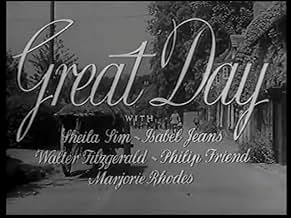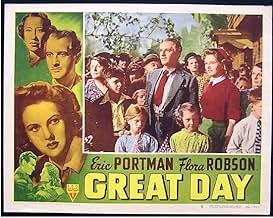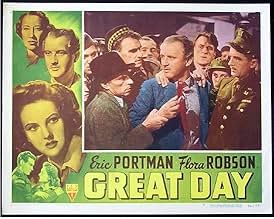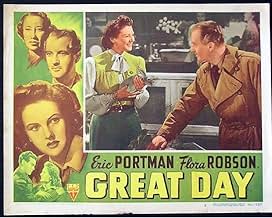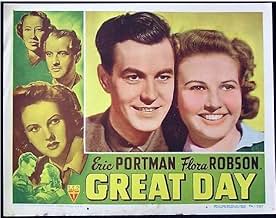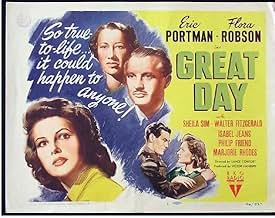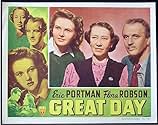Ajouter une intrigue dans votre langueAn impending Eleanor Roosevelt visit causes bustle in an English village, while the Ellis family struggles with private problems.An impending Eleanor Roosevelt visit causes bustle in an English village, while the Ellis family struggles with private problems.An impending Eleanor Roosevelt visit causes bustle in an English village, while the Ellis family struggles with private problems.
- Réalisation
- Scénario
- Casting principal
Avis à la une
The ladies of the English village of Denley are called to a meeting. Eleanor Roosevelt is coming for a secret visit. Everybody is excited to prepare for the privilege. The Ellis family has their internal dramas.
This was released in London on April 13 1945 and after the war in the States. President Roosevelt happened to die on April 12, 1945. It must have been quite a dark emotional premier if they even had one. I can also see why this was a box office failure. As a movie, this drama is a bit of Our Town at war. The small town affair doesn't mean a whole lot to me, but there are interesting war discussions. It's British. It's based on a play. It failed.
This was released in London on April 13 1945 and after the war in the States. President Roosevelt happened to die on April 12, 1945. It must have been quite a dark emotional premier if they even had one. I can also see why this was a box office failure. As a movie, this drama is a bit of Our Town at war. The small town affair doesn't mean a whole lot to me, but there are interesting war discussions. It's British. It's based on a play. It failed.
From the title, and from the brief plot summary, you might expect this to be another wartime morale booster. If it is, it is a strange one indeed.
The story is set in an English village preparing for a visit from Eleanor Roosevelt. So you might expect a celebratory story about a hard pressed but noble people. If so, you would be wrong.
Far from being noble, some of the village women are petty, gossipy, and borderline vicious. Many of course are not, but they are portrayed as normal, not noble. The story centers on the Ellis family, who have apparently moved to the village after failing elsewhere. The father, John Ellis (quite effectively portrayed by Eric Portman) is a failure in life, hanging on to his one moment of glory as an Army Captain in World War I. His wife, Flora Robson in another great performance, is long-suffering and supportive, and our hearts go out to her. Their daughter, Shelia Sim, must choose between two men: one an exciting young man her age and an older but settled man. What makes the decision difficult for her is that she has had too much of going without or just barely getting by so that she is strongly drawn security offered by the older man.
I find the remark of another viewer about obvious sets odd. Though there are some scenes like this, I found the black and white outdoor scenes quite impressive and striking. Even some scenes, such as two men talking in a field, that could have been filmed on a set were actually filmed outdoors. I was especially struck by the scenes where the father wanders the country at night, emotionally if not physically lost, while his daughter searches for him.
The movie does end on a triumphant note with Mrs. Roosevelt's visit, but if you want to see this as propaganda I guess the message would be that even these flawed people are worthwhile. For me this film was a well made, well written, well acted, interesting and moving character study.
The story is set in an English village preparing for a visit from Eleanor Roosevelt. So you might expect a celebratory story about a hard pressed but noble people. If so, you would be wrong.
Far from being noble, some of the village women are petty, gossipy, and borderline vicious. Many of course are not, but they are portrayed as normal, not noble. The story centers on the Ellis family, who have apparently moved to the village after failing elsewhere. The father, John Ellis (quite effectively portrayed by Eric Portman) is a failure in life, hanging on to his one moment of glory as an Army Captain in World War I. His wife, Flora Robson in another great performance, is long-suffering and supportive, and our hearts go out to her. Their daughter, Shelia Sim, must choose between two men: one an exciting young man her age and an older but settled man. What makes the decision difficult for her is that she has had too much of going without or just barely getting by so that she is strongly drawn security offered by the older man.
I find the remark of another viewer about obvious sets odd. Though there are some scenes like this, I found the black and white outdoor scenes quite impressive and striking. Even some scenes, such as two men talking in a field, that could have been filmed on a set were actually filmed outdoors. I was especially struck by the scenes where the father wanders the country at night, emotionally if not physically lost, while his daughter searches for him.
The movie does end on a triumphant note with Mrs. Roosevelt's visit, but if you want to see this as propaganda I guess the message would be that even these flawed people are worthwhile. For me this film was a well made, well written, well acted, interesting and moving character study.
"Great Day" couldn't be described as a great film by any stretch but it has enough of the incidental pleasures present in so many English movies (for me anyway) to be worth seeing.
First of all Eric Portman is outstanding as the pathetic WW1 Captain whose time has passed. He reminded me a little of David Niven in "Separate Tables". Flora Robson as his supportive wife is also excellent, no surprises there. It struck me looking at the familiar faces in the cast that so many of these actors always seem to have been middle-aged, was there a young Irene Handl or John Laurie, was there ever a teenage Kathleen Harrison, Marjorie Rhodes or Patricia Hayes? I can't recall them.
While it's fascinating to see the Women's Institute in action in Village England "Great Day" is very studio-bound with too obvious back-projection and the dialogue tends to the stilted. (I did like one line about a dinner invitation "Kill the fatted spam") And was Britain always drenched in sunshine?
"Great Day" is well worth one look.
First of all Eric Portman is outstanding as the pathetic WW1 Captain whose time has passed. He reminded me a little of David Niven in "Separate Tables". Flora Robson as his supportive wife is also excellent, no surprises there. It struck me looking at the familiar faces in the cast that so many of these actors always seem to have been middle-aged, was there a young Irene Handl or John Laurie, was there ever a teenage Kathleen Harrison, Marjorie Rhodes or Patricia Hayes? I can't recall them.
While it's fascinating to see the Women's Institute in action in Village England "Great Day" is very studio-bound with too obvious back-projection and the dialogue tends to the stilted. (I did like one line about a dinner invitation "Kill the fatted spam") And was Britain always drenched in sunshine?
"Great Day" is well worth one look.
In a small English village, everyone is excited because Mrs. Roosevelt is going to visit the town.
Not that this forms much more than a background to the subplots that are going on. Much time is devoted to retired captain Eric Portman, who is nearly broke but has been putting on a front for a long time; his long-suffering wife, Flora Robson; and their daughter, Sheila Sim. Miss Sim is carrying on a love affair with a young soldier, while proposing to marry a well-to-do older man for security.
It's all very well performed, but the way the script is talking about how Mrs. Roosevelt is coming not as the First Lady, but as a wife and mother one moment, and Portman is caught stealing ten bob the next makes it difficult to maintain more coherence.
Eleanor Roosevelt was known for turning up in the most unexpected places. There's an old New Yorker cartoon of two coal miners deep underground; one of them announces "Why, it's Mrs. Roosevelt!"
Not that this forms much more than a background to the subplots that are going on. Much time is devoted to retired captain Eric Portman, who is nearly broke but has been putting on a front for a long time; his long-suffering wife, Flora Robson; and their daughter, Sheila Sim. Miss Sim is carrying on a love affair with a young soldier, while proposing to marry a well-to-do older man for security.
It's all very well performed, but the way the script is talking about how Mrs. Roosevelt is coming not as the First Lady, but as a wife and mother one moment, and Portman is caught stealing ten bob the next makes it difficult to maintain more coherence.
Eleanor Roosevelt was known for turning up in the most unexpected places. There's an old New Yorker cartoon of two coal miners deep underground; one of them announces "Why, it's Mrs. Roosevelt!"
10clanciai
This is one of those small films about small matters looming to greatness. It's just a small village making a big fuss about a great occasion falling suddenly upon them, making them all contribute a last great war effort to welcome - Eleanor Roosevelt. Of course, she never appears in the film, because the film is about all those small common very human people who are looking foraward to receiving her by making the best possible impression. This is not so easy, as there are tragedies on the way, there is a love affair that turns out in odd ways, there is jealousy among the ladies, and there is Eric Portman in perhaps his finest act. He was always made to play impossible roles, often murderers and at least very unsympathetic characters, and this is no exception, but more overwhelmingly human in its pathetic realism. He has memories of the first world war and has been doing nothing since but living on those memories with a wife and daughter always being obliged to take care of him when he falls, but he makes this impossible role just perfectly, and you will cry for him if not for all the gorgeous community of mostly ladies just making an effort. William Alwyn's music crowns it all with an addition of Hubert Parry in the end to suit Eleanor Roosevelt together with the Star Spangled Banner. Also the cinematography is a marvel with its many close-ups, really closing in on people with their innermost feelings, like Eric Portman in the beginning with his daughter watching birds; but perhaps the greatest impression of all is made by the wonderful dialogue all the way -- it's a vast river of brilliant conversation, nothing remarakable, nothing eloquent, but flowing incessantly of just human nature. In brief, this is one of those very small films that tower above many great ones.
Le saviez-vous
- AnecdotesAccording to an article in the April 30, 1945 edition of the Monthly Film Bulletin (a B.F.I. publication), the running time of British-released prints was one hour and 20 minutes, suggesting a considerable amount of footage was cut before its release in the U.S.
- GaffesTowards the end when Flora Robson is talking Eric Portman into seeing Eleanor Roosevelt's visit to the village, she places her hand on his right shoulder, then her hand is on the top of his arm and then back on his shoulder again.
- Citations
John Ellis: I *will* not be bullied in my own house.
- Crédits fousAt the very end, there is a dedication to the womens institutes, in appreciation for the contributions they have made to the war effort through their crafts.
Meilleurs choix
Connectez-vous pour évaluer et suivre la liste de favoris afin de recevoir des recommandations personnalisées
Détails
- Date de sortie
- Pays d’origine
- Langue
- Aussi connu sous le nom de
- Corazones intrépidos
- Lieux de tournage
- Denham, Uxbridge, Buckinghamshire, Angleterre, Royaume-Uni(exteriors and surrounding area)
- Sociétés de production
- Voir plus de crédits d'entreprise sur IMDbPro
- Durée1 heure 20 minutes
- Couleur
- Rapport de forme
- 1.37 : 1
Contribuer à cette page
Suggérer une modification ou ajouter du contenu manquant


